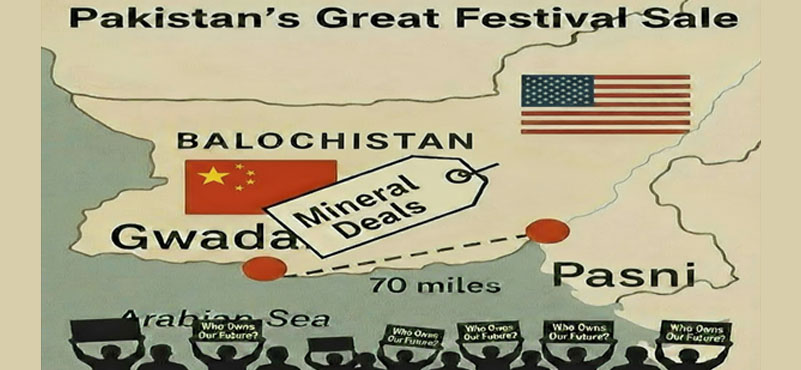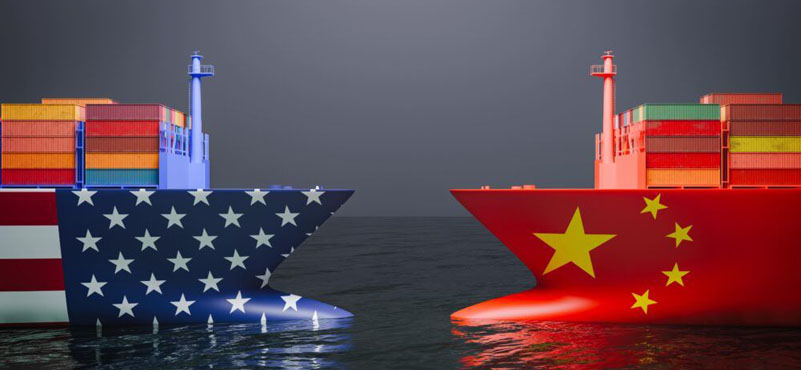“A nation that sells its future for survival loses both. Pakistan’s sovereignty is being traded, asset by asset, deal by deal.”
Pakistan is selling its geography and soul. From its mineral reserves to its ports, every strategic asset now carries a price tag. Desperation has replaced strategy, and survival has taken the shape of surrender. What was once pitched as strategic autonomy has turned into a clearance sale of sovereignty linked to debts, minerals, ports and desperation.
In recent weeks, Islamabad has signed a 500-million-dollar contract with an American company on critical minerals and even hinted to Washington about building Pasni Port. Every move resembles less and less partnership and more pawnshop diplomacy.
Minerals for Cash, Not Capacity
The deal with U.S. Strategic Metals and the Frontier Works Organisation was announced as a milestone. In reality, it reflects how far Pakistan has fallen. A state that once prided itself on “strategic autonomy” is now exporting unprocessed ore because it cannot afford to build its own refineries.
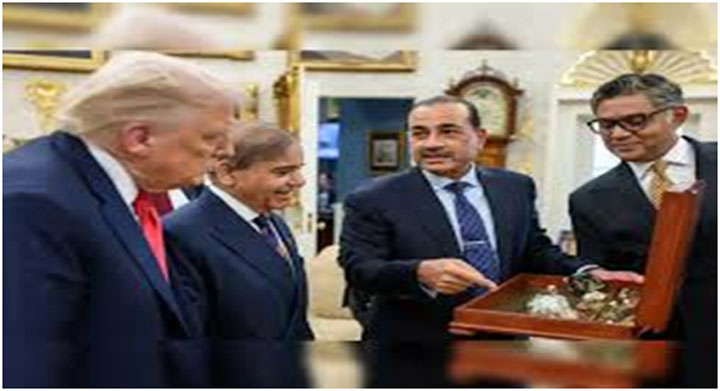
Copper, antimony, tungsten, and rare earths are the backbone of modern industry. Whoever controls them controls the next century of technology. By allowing foreigners to extract, refine, and export these resources, Pakistan is trading the keys of its own future for a temporary infusion of dollars.
No new industrial chain is being created. No local jobs are guaranteed. The minerals will be dug out, loaded on ships, and gone. Islamabad will pocket a fraction of the value while losing permanent control over resources that could have underpinned national growth. This is not foreign investment. It is liquidation.
Pasni: A Port Too Close for Comfort
The supposedly Pasni Port deal crosses a far more dangerous line – a U.S.-linked mineral port on Beijing’s doorstep. Reports suggest that Pakistan wants the US to invest $1.2 billion to build and operate a terminal at Pasni Port in Balochistan province. Pakistan also wants the US to build and operate a railway line linking Pasni to its western provinces. Only 11O Kms from the China-run $62 billion flagship CPEC crown Gwadar port, Pasni would give the United States a presence at the edge of Beijing’s flagship Belt and Road project.
The logic is too obvious. Gwadar has become a liability. Baloch militants attack Chinese assets regularly. Local resentment runs deep. Chinese labour dominates the workforce, and Baloch communities are excluded from the profits. The promise of prosperity has dissolved into a sense of occupation.
Pasni is Islamabad’s way of telling Beijing that it has other options. It is also a signal to Washington that Pakistan is willing to switch allegiances if the price is right. That is not diplomacy. That is blackmail dressed as balancing.
But the danger is that once both great powers are entrenched on its coastline, Pakistan will control neither. It will end up being squeezed between two external patrons competing for influence. Gwadar will remain under Chinese protection. Pasni will fall under American management. Islamabad will have sovereignty in name but not in practice.
The Great Game Reversed
Pakistan once weaponised geography to extract aid and attention. That playbook has expired. Geography has turned into a trap. China sees Pasni as an attempt to weaken CPEC and dilute its strategic access to the Arabian Sea. The United States views it as a way to undercut China’s western flank without deploying troops. Both will tighten their grip.
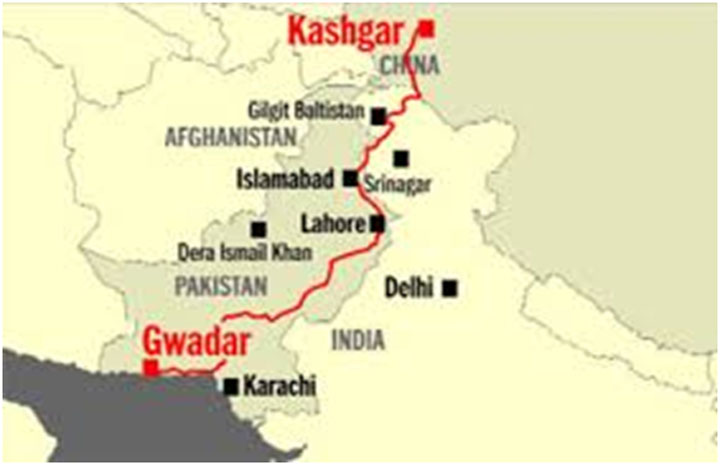
To China, Pakistan is a debt-burdened ally now hedging against Beijing’s influence. To Washington, it is a convenient but unreliable outpost. Both powers will engage, invest, and pressure, but neither will empower Islamabad. The landlord is becoming the tenant.
The Baloch Time Bomb
The people of Balochistan are once again spectators as their land is sold from Islamabad’s boardrooms. They provide the minerals, the ports, and the coast, but remain voiceless and jobless. Infrastructure bypasses their towns, and profits bypass their pockets.
For decades, exploitation has replaced integration. Now the pattern repeats. Gwadar is fenced off. Pasni may follow. Militants will see it as confirmation that the Baloch land is for sale. The insurgency that bleeds the southwest will spread along the entire Makran coast if local consent is ignored. Infrastructure projects bypass their towns. Security forces suppress dissent instead of addressing grievances. Each new deal signed in Islamabad reinforces the perception that Balochistan is being colonised under different flags.
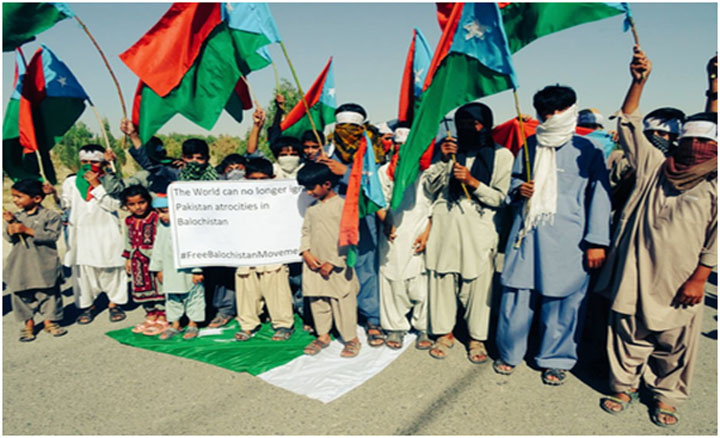
If Pasni proceeds without local consultation, the backlash will be fierce. Militants will view it as proof that Baloch lands are up for sale. The spiral of violence that already bleeds Gwadar could consume the entire coastline.
Implications for India
For India, Pakistan’s strategic auction has both risks and opportunities.
The risk lies in the short term. If the United States develops Pasni, Washington could regain limited influence in the Arabian Sea. It would also gain physical access close to India’s western flank, adding a new layer of complexity to maritime security planning. American activity near Gwadar will not be hostile to India, but it will reshape the region’s logistics map in unpredictable ways.
The opportunity, however, lies in the long game. Pakistan’s willingness to sell itself to both powers exposes its strategic bankruptcy. The country that once claimed parity with India is now trading sovereignty for survival. Every external dependency erodes its leverage, weakens its institutions, and deepens internal discord.
India can afford patience. A Pakistan caught between Chinese debt, American expectations, Baloch anger and Afghanistan TTP attacks will have little energy left for adventurism. A state losing control of its own assets cannot destabilise others indefinitely. New Delhi’s task is to strengthen its maritime partnerships, secure energy routes through the Arabian Sea, and quietly let Pakistan’s contradictions ripen. Yet be prepared for the rogue state and its irrationality.
The Cost of Selling Everything
Pakistan’s current course is not reform. It is surrendered by instalments. Each deal signed for short-term relief chips away at national control. A nation that sells its minerals loses its foundation. A nation that sells its ports loses its freedom of movement. A nation that sells both loses its future.
The so-called “Pakistan Festival Sale” may bring applause from creditors and investors, but it comes at the cost of dignity. The country’s geography, once its greatest strength, has become its only commodity. Its rulers are no longer negotiating; they are pawning the state. When a nation begins to trade sovereignty for solvency, the endgame is predictable. First come the contracts. Then come the conditions. Finally comes the control.
If Islamabad continues down this road, the question will not be who supports Pakistan; it will be who owns it. And by the time that question is answered, there may not be a sovereign Pakistan left to ask it.
ABOUT THE AUTHOR
 Lieutenant General A B Shivane, is the former Strike Corps Commander and Director General of Mechanised Forces. As a scholar warrior, he has authored over 200 publications on national security and matters defence, besides four books and is an internationally renowned keynote speaker. The General was a Consultant to the Ministry of Defence (Ordnance Factory Board) post-superannuation. He was the Distinguished Fellow and held COAS Chair of Excellence at the Centre for Land Warfare Studies 2021 2022. He is also the Senior Advisor Board Member to several organisations and Think Tanks.
Lieutenant General A B Shivane, is the former Strike Corps Commander and Director General of Mechanised Forces. As a scholar warrior, he has authored over 200 publications on national security and matters defence, besides four books and is an internationally renowned keynote speaker. The General was a Consultant to the Ministry of Defence (Ordnance Factory Board) post-superannuation. He was the Distinguished Fellow and held COAS Chair of Excellence at the Centre for Land Warfare Studies 2021 2022. He is also the Senior Advisor Board Member to several organisations and Think Tanks.

